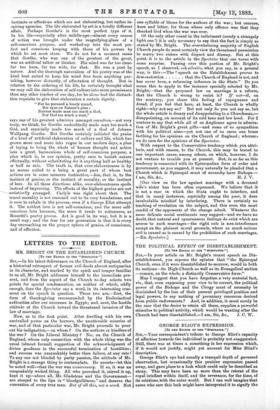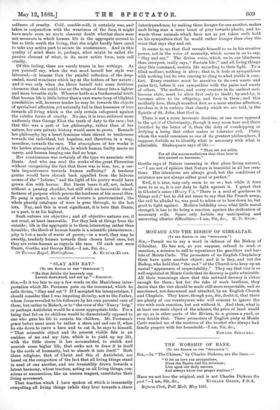GEORGE ELIOT'S EXPRESSION.
[TO THE EDITOR OF THE " SPECTATOR:9
SIR,—Your correspondent's tribute to George Eliot's capacity of affection towards the individual is probably not exaggerated. Still, there was at times a something in her expression which, if it would not justify, might yet account for Miss Blind's description.
George Eliot's eye had usually a tranquil depth of garnered. observation, but occasionally this positive expreseion passed. away, and gave place to a look which could. only be described as stony. This may have been no more than the retreat of the royal intellect within itself, and the severance, for the time, of its relations.with the outer world. But I can well imagine that some who saw this look might have interpreted it to signify the
coldness of cruelty. Cold, marble-cold, it certainly was, and, taken in conjunction with the weariness of the face, it might have made even an acute observer doubt whether there were not moments in which human life in the aggregate seemed to her so little worth the living, that she might hardly have cared to take any active part to secure its continuance. And in this .quality of mind there is, perhaps, what might be called the passive element of what, in its more active form, men call cruelty.
Of this feeling, there are surely traces in her writings. As you yourself say, when she was most herself her style was laboured,—it became then the painful reflection of the deep- seated, moral weariness which lay at the bottom of her nature ; and it was only when she threw herself into some fictitious character that she could rise on the wings of fancy into a lighter and more loveable style. Whoever holds as a fundamental truth that human life is little better than a vast waste-heap of blighted possibilities will, however tender he may be towards the objects of specialised affection, yet naturally fail in that keenness of love towards all living which is the only certain safeguard against the subtler forms of cruelty. No one, it is true, enforced more uniformly than George Eliot the truth of duty to the race ; but that this was a part of her philosophy, rather than of her nature, her own private history would seem to prove. Beneath her philosophy lay a heart feminine when stirred to tenderness towards the individual, but hopeless, and therefore, in a way, merciless, towards the race. The atmosphere of her works is the leaden atmosphere of fate, in which human frailty meets no mercy, and human longing can find no hope.
Her countenance was certainly of the type we associate with Dante. And who can read the works of the great Florentine without recognising the fact that there was in him, too, a cer- tain impassiveness towards human suffering ? A tenderer genius would have shrunk back appalled from the hideous scenes of the "Inferno," and the light of his poetry would have grown dim with horror. But Dante bears it all, not, indeed, -without a passing shudder, but still with an inexorable stead- fastness of purpose which proves the hardness of his moral fibre. No pang is sparei, no nicety of torture is praetermitted ; the whole ghastly catalogue of woes is gone through, to the last iota. Nay, and this is most significant, it is here that Dante, as a poet, is at his highest.
• Such natures are objective ; and all objective natures are, if not cruel, at least inexorable. For they look at things from the outside ; life in the aggregate is to them interesting rather than loveable ; the throb of human hearts is a scientific phenomenon ; pity is but a mode of waste of power,—in a word, they may be sweetly, tenderly human towards their chosen loved ones, but they are extra-human as regards the race. Of such sort were Dante, Goethe, and George Eliot.—I am, Sir, &c.,



































 Previous page
Previous page